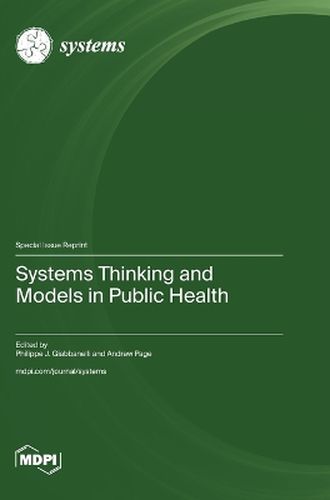Readings Newsletter
Become a Readings Member to make your shopping experience even easier.
Sign in or sign up for free!
You’re not far away from qualifying for FREE standard shipping within Australia
You’ve qualified for FREE standard shipping within Australia
The cart is loading…






This title is printed to order. This book may have been self-published. If so, we cannot guarantee the quality of the content. In the main most books will have gone through the editing process however some may not. We therefore suggest that you be aware of this before ordering this book. If in doubt check either the author or publisher’s details as we are unable to accept any returns unless they are faulty. Please contact us if you have any questions.
Systems thinking and modeling have been essential approaches to identifying the drivers of health outcomes and analyzing their complex interrelationships, paving the way to interventions that improve outcomes while minimizing unintended consequences. These methods support interdisciplinary teams in representing and navigating complex systems, thus asking essential 'what-if' questions and serving numerous other goals, from guiding data collection efforts to comparing the perspectives of stakeholders or validating theories. This volume features methodological innovations and applications for several determinants and key global health priority areas.
Priority determinants include, but are not limited to, social determinants (e.g., health inequalities), behavioral factors and facets of the healthcare system. Systems thinking and modeling can shed light on how such determinants ultimately shape health outcomes and/or the cost-effectiveness of an intervention. This volume covers several determinants, collectively providing a comprehensive overview of the challenges and applications of systems thinking to public health.
This volume will benefit researchers in the fields of public health, systems thinking or modeling. The content is accessible to early-career researchers, such as graduate students, who may choose specific chapters within their areas of interest as part of identifying open challenges to inspire their own research.
$9.00 standard shipping within Australia
FREE standard shipping within Australia for orders over $100.00
Express & International shipping calculated at checkout
This title is printed to order. This book may have been self-published. If so, we cannot guarantee the quality of the content. In the main most books will have gone through the editing process however some may not. We therefore suggest that you be aware of this before ordering this book. If in doubt check either the author or publisher’s details as we are unable to accept any returns unless they are faulty. Please contact us if you have any questions.
Systems thinking and modeling have been essential approaches to identifying the drivers of health outcomes and analyzing their complex interrelationships, paving the way to interventions that improve outcomes while minimizing unintended consequences. These methods support interdisciplinary teams in representing and navigating complex systems, thus asking essential 'what-if' questions and serving numerous other goals, from guiding data collection efforts to comparing the perspectives of stakeholders or validating theories. This volume features methodological innovations and applications for several determinants and key global health priority areas.
Priority determinants include, but are not limited to, social determinants (e.g., health inequalities), behavioral factors and facets of the healthcare system. Systems thinking and modeling can shed light on how such determinants ultimately shape health outcomes and/or the cost-effectiveness of an intervention. This volume covers several determinants, collectively providing a comprehensive overview of the challenges and applications of systems thinking to public health.
This volume will benefit researchers in the fields of public health, systems thinking or modeling. The content is accessible to early-career researchers, such as graduate students, who may choose specific chapters within their areas of interest as part of identifying open challenges to inspire their own research.